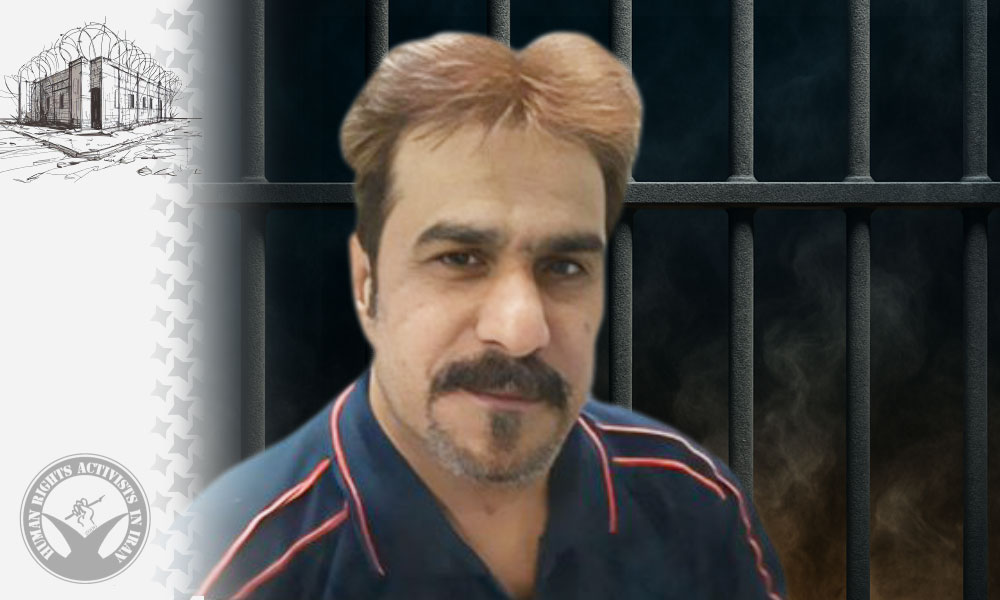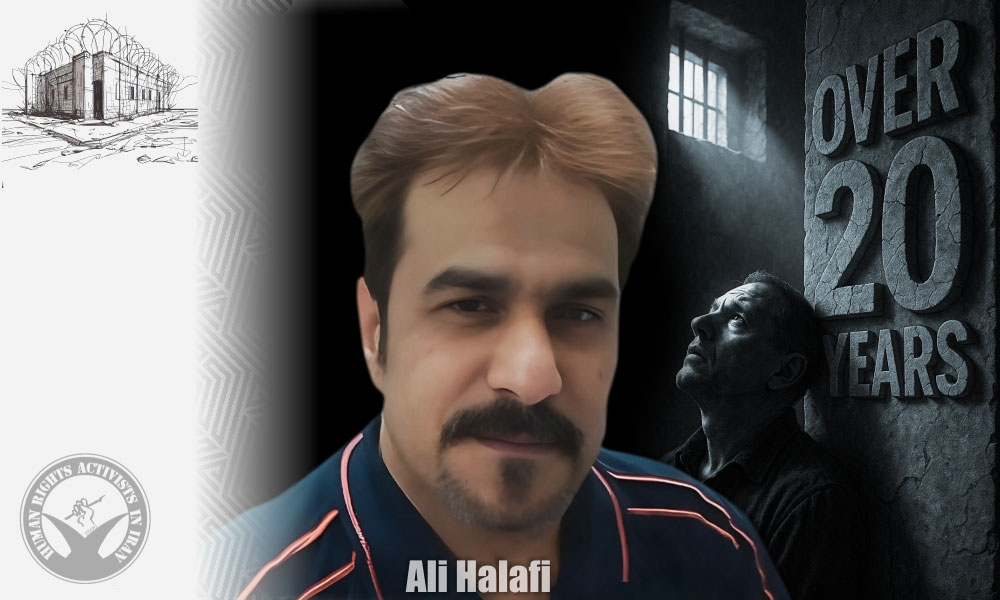HRANA – Numerous political and religious prisoners in Iran have spent more than two decades in detention. To ensure their stories are not lost amid the constant churn of daily news, HRANA publishes a series of reports dedicated to them. Each report reviews the prisoner’s case history, prison conditions, access to basic rights, and urgent needs.
In this report, HRANA, the news agency of Human Rights Activists in Iran, examines the latest situation of Ali Halafi after two decades of imprisonment.
Information Sheet
• Name: Ali Halafi
• Year of Arrest: 2005
• Charges Announced: “Acting against national security, moharebeh (enmity against God), and corruption on earth”
• Initial Sentence: 30 years in prison in exile
• Current Sentence: 30 years in prison in exile
• Prison Locations: After sentencing, he spent one year in Karun Prison in Ahvaz. He was then exiled to Gonabad Prison, where he served ten years. In 2016, Halafi was transferred to Masjed Soleyman Prison and later to Sheiban Prison in Ahvaz, where he has since been held without observance of the principle of separating prisoners by offense.
• Furlough / Access: No furlough has been reported in recent years; access to family and lawyer has been limited.
• Current Status: Still in long-term imprisonment despite legal changes that could allow for review or sentence reduction.
Case Narrative and Judicial Process
Ali Halafi was arrested in 2005 by security forces in connection with the so-called “Salman Farsi Street explosion in Ahvaz.” Although not one of the main defendants in the case, he was later sentenced by the Ahvaz Revolutionary Court to 30 years in prison in exile on charges of “acting against national security, moharebeh, and corruption on earth.” This sentence was upheld in full by the Court of Appeals.
The ruling placed him among prisoners with de facto indefinite terms, a status that can extend incarceration for many years and severely restrict access to mechanisms of legal review.
Key Points in the Process:
• Heavy Security Charges: The “moharebeh” charge is one of the most severe in Iran’s political-security cases, carrying wide-reaching judicial and executive consequences.
• Continued Imprisonment Despite Legal Changes: Although legal reforms have allowed for retrials, sentence reductions, or conditional release in some moharebeh cases, Halafi remains imprisoned.
Prison Conditions and Transfers
Over his imprisonment, Halafi has been held in Karun Prison (Ahvaz), Gonabad Prison, Masjed Soleyman Prison, and Sheiban Prison (Ahvaz). After sentencing, he spent one year in Karun Prison, then ten years in Gonabad Prison. In 2016, he was moved to Masjed Soleyman Prison, and shortly thereafter transferred to Ward 5 of Sheiban Prison in Ahvaz, where he remains, without proper separation of offenses.
Observations on Detention Standards
• Frequent Transfers: Repeated relocations between wards and prisons disrupt family contact, legal access, and medical care.
• Exposure to Violence in Prison: Reports indicate verbal abuse and beatings. During his arrest, Halafi suffered broken ribs from beatings by security agents, requiring surgery. In April 2024, he was reportedly beaten by guards in Ward 5 of Sheiban Prison. In December of the same year, after protesting poor conditions, denial of medical care, and the transfer of violent-crime prisoners to his ward, he was threatened with solitary confinement or exile to a remote prison. These instances highlight the urgent need for independent documentation and legal follow-up.
• Denial of Medical Care: Despite suffering from stomach ulcers, intestinal infections, and lung problems, Halafi has consistently been denied hospital transfers and specialized treatment for over two decades. Denying prisoners access to medical care constitutes inhumane treatment and violates the right to health—and in some cases, even the right to life—recognized under Iranian law, international standards, and human rights instruments. It is also used as a tool of coercion and repression.
Access to Family, Lawyer, and Furlough
Halafi has not received furlough in recent years, and his access to family and legal counsel has been limited. Such restrictions carry severe psychological and social consequences, while also undermining his ability to mount an effective defense or pursue retrial mechanisms.
Potential Legal Avenues (General Recommendations):
1. Retrial: Review based on new evidence or substantive/procedural flaws.
2. Request for Sentence Reduction or Commutation: If legal conditions allow.
3. Conditional Release / Suspension of Sentence: If criteria such as time served, good conduct, or health are met.
4. Addressing Rights Violations in Prison: Including the right to healthcare, protection from violence, regular visitation, and legal counsel.
5. Documentation and International Advocacy: Utilizing international reporting and human rights mechanisms where domestic remedies are blocked.
Timeline Summary
• 2005: Arrest; charges of “acting against national security, moharebeh, corruption on earth.”
• Initial Sentence: 30 years in prison in exile.
• 2005: Reports of beating during arrest; severe rib fractures requiring surgery.
• Post-sentencing: One year in Karun Prison (Ahvaz).
• 2006: Exiled to Gonabad Prison for ten years.
• 2016: Transferred to Masjed Soleyman Prison.
• April 2024: Reported beating in Ward 5 of Sheiban Prison.
• Recent years: No furlough, denial of proper medical care, limited access to family and lawyer.
• Current Status: Continued imprisonment despite legal changes that could affect case review.
Conclusion and Importance of Case Review
Despite legal changes that provide avenues for retrial, sentence reduction, or release for those convicted of moharebeh, Halafi remains imprisoned. His case exemplifies long-term political-security imprisonment in Iran, highlighting the importance of legal review to secure justice and possible release.
His file underscores both the difficulties of accessing fundamental rights in prison (furlough, visits, legal counsel) and the urgent need to employ all available domestic and international mechanisms for sentence review and reduction.
Urgent Needs:
• Regular and non-discriminatory access to lawyer and family.
• Independent medical evaluation for alleged beatings and long-term complications.
• Examination of eligibility for retrial or other mechanisms for sentence reduction/suspension.
• Guarantee of compliance with prison regulations on contact, visits, and furlough.
• Access to adequate medical services and treatment.
About This Series
This report is part of the “More than Two Decades Behind Bars” series, which aims to continuously document long-term imprisonment cases and remind the public of the collective responsibility to ensure they are seen and their conditions are pursued.





